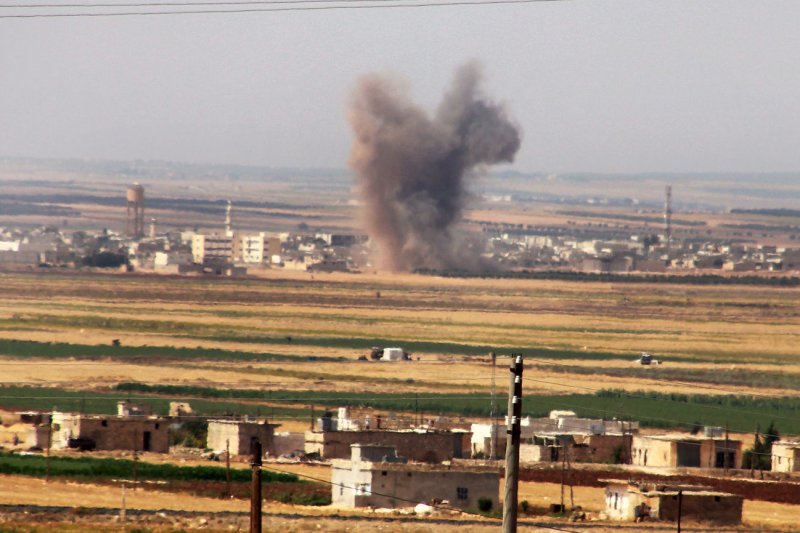Black smoke rises over Aleppo, Syria, after government airstrikes on September 12, 2012. The Kurdish YPG captured a strategic town overlooking roads leading into Aleppo City on Monday, inciting anger in Turkey and Syrian rebel commanders who say the U.S.-backed Kurds are coordinating with the Syrian military during a Russian-backed offensive in Aleppo province. File Photo by Ahmad Deeb/ UPI |
License Photo
ALEPPO, Syria, Feb. 16 (UPI) -- Kurdish rebels captured a strategic town during overnight fighting with Arab rebel forces in northwestern Syria's Aleppo province, according to activists.
The Syrian Observatory for Human Rights, a Britain-based monitoring group, said Monday the Syrian Democratic Forces -- a U.S.-backed coalition of Kurdish, Arab and Assyrian rebel groups -- gained control over Tell Rifaat, which overlooks the junction of two main roads leading to Aleppo City.
One of the SDF's main fighting units is the Kurdish People's Protection Units, or YPG, which has recently captured territory along much of Turkey's southern border and has been under attack by the Turkish military since Saturday.
The YPG and its SDF allies also captured the nearby village of Kafr Naseh on Monday, SOHR reported.
The Kurdish advances coincide with a Russian-backed Syrian military offensive in Aleppo province that has caused tens of thousands of refugees to flee for the Turkish border.
Turkey considers the YPG and its political arm, the Democratic Union Party, or PYD, to be terrorist organizations. Ankara sees the groups as offshoots of the Kurdistan Workers' Party, or PKK -- which has for decades battled security forces inside Turkey in a bid for autonomy.
However, the SDF, and particularly the YPG, have been key ground allies of the U.S.-led coalition against the Islamic State, which has conducted airstrikes in support of Kurds fighting against IS forces in the al-Hasakah and Raqqa provinces -- and more recently at the Tishreen Dam in the Aleppo province.
The United States and the European Union consider the PKK to be a terrorist group, and last week Turkish President Recep Tayyip Erdogan denounced the United States for its failure to recognize the PYD in the same light.
Abu Ali Sijjos, an Arab rebel commander overseeing security at the Bab al-Samah border crossing, told Voice of America the loss of Tell Rifaat means rebel fighters lack a defensive line that would enable them to protect displaced civilians gathered at the border to escape Russian airstrikes.
He said refugees would storm the crossing if the Syrian military or YPG advanced into the "Azaz pocket" -- referring to a border town recently captured and then abandoned by the Kurds.
Turkish airstrikes and artillery fire reportedly forced the YPG from Azaz on Monday, and Turkish Prime Minister Ahmet Davutoğlu promised the "harshest reaction" if the Kurds approached the town again.
"The Turks keep issuing statements that Azaz is a red line for them, but we don't take them seriously," Ali Sijjos told VOA. "The Turkish shelling is not really assisting us. It is doing nothing to deter the Russian airstrikes."
The Ankara government began attacking the Kurds after accusing them of firing on Turkish troops over the weekend. Davutoğlu said he would not allow the YPG "to carry out aggressive acts" and had earlier warned that Turkey would attack any threats on its border.
U.S. and French officials urged Turkey -- a NATO ally and member of the anti-IS coalition -- to cease its attacks. Pentagon spokesman John Kirby called on both Ankara and the YPG to exercise restraint and refocus efforts against IS fighters, while the Syrian government of President Bashar al-Assad characterized Turkey's actions as "direct support to armed terrorist organizations."
Turkey and Arab rebels with the Free Syrian Army, which is also supported by the U.S.-led coalition, accuse the YPG of colluding with Russia and the Syrian military.
Turkish officials say the YPG is purposefully forcing Sunni Arab families out of the northern Aleppo countryside in order to add to Kurdish territories in Syria -- and that the Kurds had received an endorsement from Assad.
SOHR reported last week the YPG captured two Aleppo province towns -- Deir Jamal and Mar'anaz -- at the request of Arab residents seeking protection from Russian airstrikes.
Some Arab rebel commanders said the YPG was not being bombed and this proved the group was coordinating with Damascus and Moscow.
YPG commanders denied working with pro-Assad forces and noted Kurdish fighters had captured a road south of Deir Jamal, thus preventing regime troops from advancing on Tell Rifaat -- which lies north of Nubbul and al-Zahra, where government forces broke two rebel sieges and cut off a major rebel supply line from Turkey to Aleppo City earlier this month.
The YPG also noted it had sheltered hundreds of Sunni Arab families in the Kurdish enclave of Afrin.
A YPG source told SOHR it had done so to "prove to everyone that Syria is for all its citizens, and that the YPG cares about the Kurdish-Arab brotherhood and is not fighting Arabs as promoted by the media."
However, FSA commanders and other opposition officials say coordination between the Assad regime and the YPG is clear and unforgivable.
Daveed Gartenstein-Ross, an analyst with the Foundation for the Defense of Democracies, a Washington think tank, told VOA the situation in Aleppo province is "a complete mess."
"There are literally U.S.-backed groups fighting other U.S.-backed groups right now," he said. "Specifically, the U.S.-backed opposition in northern Aleppo is fighting the U.S.-backed YPG. I have never seen a situation where one CIA-backed group is fighting another with this kind of intensity. It illustrates why so many people have trouble trusting the United States. It's hard for people to believe our government is this incompetent, so they search for some hidden conspiracy."















